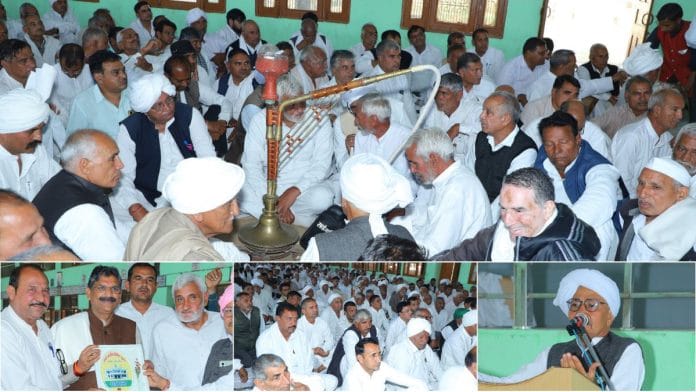Gurugram: The Binain Khap, one of Haryana’s most influential khap panchayats, has called for a complete ban on live-in relationships and resolved to ostracise individuals in such unions. The decision was taken at a meeting at Danoda village in Jind under the leadership of Khap president Raghubir Nain.
Krishan Bedi, a Haryana cabinet minister and MLA from Narwana—where Danoda is located—was also present at the gathering.
Discussions at the Sunday meeting also centered around modifying traditional funeral rituals. The khap proposed reducing the customary 13-day mourning period to seven days, and minimising extravagant post-funeral feasts that involve excessive expenditure on food and other eatables.
The attendees agreed to implement these changes gradually, acknowledging the need for modernisation while respecting traditions.
The primary agenda of the meeting was live-in relationships, which the khap deemed a growing threat to traditional Haryanvi values.
“The conservative Haryanvi society has never accepted live-in relationships, and those engaged in them have always been looked down upon. However, such cases have been on the rise in recent years,” Nain told ThePrint Monday.
“Initially, such couples reside in towns, but over time, they return to their villages. We have now decided to impose a social boycott on them and demand a legal ban on such relationships from the government.”
A formal resolution was moved to ostracise those found to be in live-in relationships, and after extensive deliberation, the decision was passed unanimously. The Binain Khap discussion also touched upon love marriages, with the khap declaring that such unions should not be registered without parental consent.
Contrasting stances on social norms
Asked about the Binain Khap’s rigid stance, especially in light of the Kajla Khap’s recent decision to support inter-caste marriages, Nain dismissed the latter’s move as a publicity stunt.
“Our society will never accept inter-caste marriages. I remember vividly how, in 1986, my father, Tek Ram Nain, who was the khap’s president at the time, proposed a resolution against the practice of ghoonghat (veil) for women,” Nain recounted.
“However, a village elder, Girdhari Lal, stood up and rejected not only that resolution but all previous ones under my father’s leadership, accusing him of attempting to dismantle our family system by making women dance on their heads.”
Kajla Khap had met at Kurukshetra last week, where the members advocated social acceptance of inter-caste marriages in view of the changed social milieu.
One of the key resolutions passed at Sunday’s Binain Khap meeting was the regulation of DJ music at weddings. Members voiced concerns that loud music played late into the night was a major inconvenience, particularly for the elderly. As a result, it was unanimously decided that DJ music should not be played after 11 pm.
(Edited by Sanya Mathur)







How many of the panchayat members were females? How many were below 30 years? The accompanyibg pictures only seen to show middle aged and aging males. In a state that has one of the lowest relative female population, the greater threat to haryanvi culture is from infanticide or rampant pernicious patriarchy than “live-in” relationships.